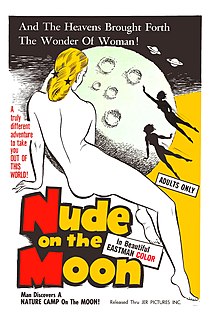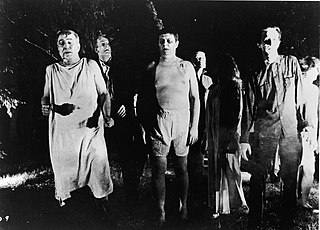Related Research Articles

John Nicholas Cassavetes was an American actor, film director, and screenwriter of Greek descent. Cassavetes was a pioneer of American independent film, writing and directing over a dozen movies, which he partially self-financed. He also acted in many Hollywood films, notably Rosemary's Baby (1968) and The Dirty Dozen (1967). He studied acting with Don Richardson, utilizing an alternative technique to method acting which privileged character over traditional narrative. His income from acting made it possible for him to direct his own films independently.

Michael Robert Winner was an English film director and producer, and a restaurant critic for The Sunday Times.

Doris Wishman was an American film director, screenwriter and producer. She is credited with having directed and produced at least thirty feature films during a career spanning over four decades, most notably in the sexploitation film genre.

Nude on the Moon is a 1961 science-fantasy nudist film co-written and co-directed by Doris Wishman and Raymond Phelan under the shared pseudonyms "O. O. Miller" and "Anthony Brooks". The film was produced in 1960 and theatrically released in 1961.

The Cinema of Greece has a long and rich history. Though hampered at times by war or political instability, the Greek film industry dominates the domestic market and has experienced international success. Characteristics of Greek cinema include a dynamic plot, strong character development and erotic themes. Two Greek films, Missing (1982) and Eternity and a Day (1998), have won the Palme d'Or at the Cannes Film Festival. Five Greek films have received nominations for the Academy Award for Best Foreign Language Film.

Nudity in film is the presentation in a film of at least one person who is nude, partially nude or wearing less clothing than contemporary norms in some societies consider "modest". Since the development of the medium, inclusion in films of any form of sexuality has been controversial, and in the case of most nude scenes has had to be justified as being part of the story, in the concept of "artistically justifiable nudity". In some cases nudity is itself the object of a film or is used in the development of the character of the subject. In some cases, nudity has been criticized as "superfluous" or "gratuitous" to the plot, and some film producers have been accused of including nudity in a film to appeal to certain audiences. Many actors and actresses have appeared nude, or exposing parts of their bodies or dressed in ways considered provocative by contemporary standards at some point in their careers.
Joseph W. Sarno was an American film director and screenwriter.

The cinema of Somalia refers to the film industry in Somalia. The earliest forms of public film display in the country were Italian newsreels of key events during the colonial period. In 1937 the film Sentinels of Bronze was produced in Ogaden Somalia, with nearly all Somali actors. Growing out of the Somali people's rich storytelling tradition, the first few feature-length Somali films and cinematic festivals emerged in the early 1960s, immediately after independence. Following the creation of the Somali Film Agency (SFA) regulatory body in 1975, the local film scene began to expand rapidly. In the 1970s and early 1980s, popular musicals known as riwaayado were the main driving force behind the Somali movie industry. Epic and period films as well as international co-productions followed suit, facilitated by the proliferation of video technology and national television networks. In the 1990s and 2000s, a new wave of more entertainment-oriented movies emerged. Referred to as Somaliwood, this upstart, youth-based cinematic movement has energized the Somali film industry and in the process introduced innovative storylines, marketing strategies and production techniques.

The 1960s and 1970s mark the golden age of the independent B movie, made outside of Hollywood's major film studios. As censorship pressures lifted in the early 1960s, the low-budget end of the American motion picture industry increasingly incorporated the sort of sexual and violent elements long associated with so-called exploitation films. The death of the Production Code in 1968 and the major success of the exploitation-style Easy Rider the following year fueled the trend through the subsequent decade. The success of the B-studio exploitation movement had a significant effect on the strategies of the major studios during the 1970s.

Lightning Over Water, also known as Nick's Film, is a 1980 West German-Swedish documentary-drama film written, directed by and starring Wim Wenders and Nicholas Ray. It centers on the last days of Ray's own life, who was already known worldwide for his 1955 classic film Rebel Without a Cause. It was screened out of competition at the 1980 Cannes Film Festival.
The cinema of Mongolia has been strongly influenced by the cinema of Russia, which differentiates it from cinematic developments in the rest of Asia.

The Adventures of Lucky Pierre is a 1961 nudie cutie film created by exploitation filmmakers Herschell Gordon Lewis and David F. Friedman. The first of its kind to be filmed in color, the film starred comedian Billy Falbo. It was unique for its time and genre, adding successful comedy to the nudity and sensationalist material.
In parallel to what happened in other Soviet republics, a cinema of Tajikistan was promoted by the Soviet state, and declined in the first years after the independence, before being revitalized through the efforts of the new government.
The Wayans family is an American show business family including a number of directors, screenwriters, comedians and actors. Notable Wayans family members include Chaunté Wayans, Damon Wayans, Kim Wayans, Marlon Wayans, Damon Wayans Jr., Keenen Ivory Wayans and Shawn Wayans. Notable works created by Wayans family members include Scary Movie, The Wayans Bros., In Living Color, White Chicks, My Wife and Kids, and Little Man (2006film).

Suburban Secrets is a 2004 sexploitation and softcore adult film, written and directed by Joseph W. Sarno. The film stars Isadora Edison, Tina Tyler, Kay Kirtland, and Chelsea Mundae. Seduction Cinema regular A.J. Khan also appears, in a film where the director transposes the theme of his 1976 "classic" Misty into a modern-day environment.

Singeetam Srinivasa Rao is an Indian film director, producer, screenwriter, composer, singer, lyricist and actor, known for his works in Telugu, Tamil, Kannada, Malayalam and Hindi films, across multiple genres. The octogenarian is widely regarded as one of the versatile directors of India. He is credited with having revolutionised the South Indian cinema with experimental films. He has garnered two National Film Awards, seven state Nandi Awards, three Filmfare Awards South, and three Karnataka State Film Awards.
Archana Galrani, better known by her stage name Sanjjanaa Galrani, is an Indian model and film actress. She made her film debut in the Tamil-Telugu bilingual film Oru Kadhal Seiveer (2006), and soon known for her controversial role in the Kannada film Ganda Hendathi (2006). Her supporting role in the 2008 Telugu film Bujjigadu directed by Puri Jagannadh was her debut into the Telugu film industry. In 2017, she played Chandri in the bilingual crime drama Dandupalya 2.

Inga is a 1968 Swedish sexploitation film directed by Joseph W. Sarno. Three years later, Sarno also directed the sequel The Seduction of Inga.

Inside Jennifer Welles is a 1977 pornographic film starring Jennifer Welles, an American porn star chiefly active in the soft and hardcore genres of the 1970s, although she began her acting career in the late 1960s in the sexploitation genre. The allegedly autobiographical film is one of the classics of the Golden Age of Porn.
Michael Luciano was an American film and television editor with about forty feature film credits and many additional credits for television programs. From 1954 to 1977, Luciano edited 20 of the films directed, and often produced, by Robert Aldrich. Aldrich was a prolific and independent maker of popular films "who depicted corruption and evil unflinchingly, and pushed limits on violence throughout his career." Their early collaboration, the film noir Kiss Me Deadly (1955), was entered into the US National Film Registry in 1999; the unusual editing of the film has been noted by several critics. Luciano's work with Aldrich was recognized by four Academy Award nominations, for Hush...Hush, Sweet Charlotte (1964), The Flight of the Phoenix (1965), The Dirty Dozen (1967), and The Longest Yard (1974). The Academy of Motion Picture Arts and Sciences never recognized Aldrich himself.
References
- ↑ Wiktor Ericsson (director) (2013). A Life in Dirty Movies (Motion picture). Anagram Produktion. Retrieved 16 January 2016.